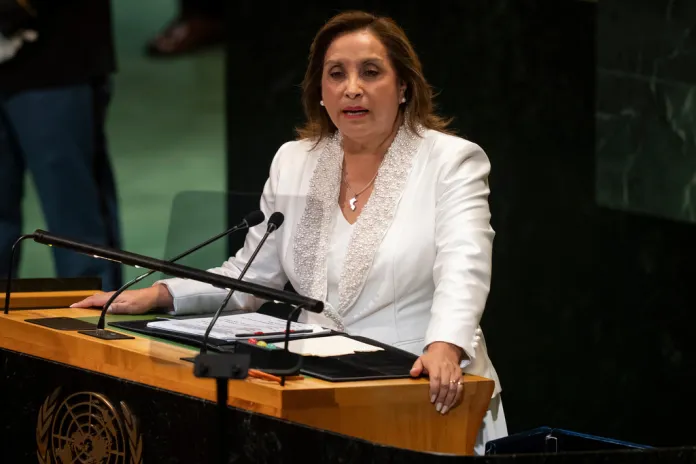


One of the most unpopular heads of state in history was removed from office Friday in a unanimous congressional vote, after nearly three years in office.
Former Peruvian President Dina Boluarte took power on Dec. 7, 2022, quickly sworn in after the eclectic populist socialist President Pedro Castillo launched a botched self-coup. As vice president, she assumed office when Castillo’s government refused to back him, leading to his arrest. Her vacillating political allegiances, reliance on the military to suppress protests, alleged corruption, and surging crime made her tremendously unpopular, earning single-digit approval ratings beginning in January 2024. After years of resilience, she was finally ousted in a 122-0 vote early on Friday after she failed to come to Congress to defend herself against corruption allegations and questions about surging crime.
Recommended Stories
- Nobel Peace Prize winner Machado dedicates award to Trump
- Polymarket odds skyrocketed for Maria Corina Machado in hours before Nobel Peace Prize win
- Blackouts envelop Ukraine as Russia targets energy infrastructure

The session of Congress was prompted by a shooting at a concert in Lima on Wednesday, laying bare the country’s growing crime problem. She was called to testify before Congress by midnight on Thursday, but was a no-show. Just after midnight, she was removed from office, with the leader of Congress, José Jerí, 38, sworn in as interim president.
Congress removed her on grounds of “permanent moral incapacity,” a term in the country’s constitution originally referring to mental injury or disability.
Boluarte tried to add a bittersweet ending to her tumultuous presidency, delivering a final address after the vote to lay out her legacy.
“I have not thought of myself, but rather of Peruvians,” she said in a nationally broadcast address, outlining her government’s accomplishments, according to the Associated Press.
In a final embarrassment, Boluarte’s address was cut off just minutes in to show Jerí’s swearing in.
Jerí pledged to safeguard Peru’s sovereignty and hand over power to the winner of the next year’s April elections in his inaugural speech. His main focus, however, was curbing crime.
“Today, we have to take immediate actions,” he told the legislature. “The evil that afflicts us in this moment is insecurity in the streets, the criminal gangs, the criminal organizations. They are today our enemies, and, as enemies, we must declare war on nationwide crime.”
Jerí will be the third Peruvian to serve out Castillo’s five-year term. The presidential baton was handed from the left-wing Castillo to the politically vacillating Boluarte, and now to the center-right Jerí.
Boluarte’s presidency was riddled with controversy from the beginning, struggling with international legitimacy after taking power during a political crisis. She quickly pivoted away from her left-wing allies and toward the armed forces and the right-wing in Congress. A week after taking power, ten protesters were massacred and over 60 were wounded by police gunfire in Ayacucho. A month later, at least 18 protesters were killed and over 100 were injured by police gunfire in Juliaca, a massacre Boluarte blamed on Bolivia.
Her cold response to the deaths, rhetorically asking, “How many more deaths do you want?” further entrenched bitterness against her.
Her situation never managed to improve, especially as her government was rocked by continuous corruption allegations. Journalists discovered that she had somehow amassed a jewelry collection valued at $500,000, despite a monthly presidential salary of $4,200.
Her reliance on the military failed to address the security situation in the country, either. Official figures showed homicide rates reaching their highest since 2017, with 6,041 people killed between January and August. Extortion complaints rose by 28% between January and July compared to the same period in 2024.
PEDRO CASTILLO, POPULIST SOCIALIST AND SCHOOLTEACHER, INAUGURATED AS PRESIDENT OF PERU
Boluarte’s main legacy is her record-breaking low popularity, by some estimates, the lowest ever. The first opinion poll taken in January 2023 had her approval rating at just 19%, a total that kept declining. By the next year she consistently polled in the single digits, and in one CPI poll, was found to have a 0% approval rating among Peruvians ages 19-24. By July 2025, her approval rating stood at just 2%.
Despite this, she managed to maintain power for nearly three years by relying on the military and right-wing parties in Congress. She had survived seven impeachment attempts before the final, fateful one on Friday.
